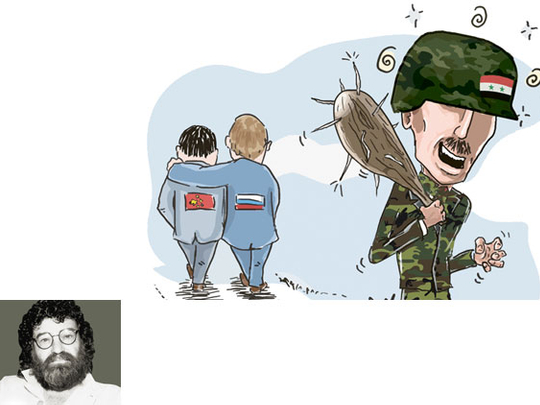
The adjectives (or perhaps they were epithets) used to describe it were vociferous and blunt, rarely used in diplomatic parlance: the Syrian regime was identified as barbaric, criminal, tyrannical, savage, murderous and the rest of it, all intended to point to a whole gamut of villany committed by a government that, for the last 11 months, has slaughtered, incarcerated and tortured its own people.
Yet irrespective of the emotive language resorted to by various diplomats at the UN, it was clear from the outset that the resolution that came up for a vote at the Security Council last week, based on an Arab League plan intended to halt the bloodbath in Syria, would be still-born, blocked as had been anticipated by the double veto from Russia and China. The act soon had grotesque consequences. Bashar Al Assad's regime took the veto as a green light to crush the protesters.
Thus in the deadly assault on Homs, regime forces have bombarded the city indiscriminately, killing hundreds of men, women and children. To date, close to 6,000 have been killed across the country, with countless others imprisoned, tortured and disappeared.
Given the horror, it is not surprising then that the Security Council resolution received a resounding ‘yes' vote from nations in locales as disparate as Western Europe and North America, the African continent and the Arab world, Latin America and South Asia. Thirteen in all, with no abstentions. It is even less surprising that by casting a veto, in effect becoming complicit in the carnage inflicted on the Arab people of Syria by a regime inexorably headed to the dust-bin of history, Russia and China have lost a lot of friends in the Arab world and beyond. Arabs, let's face it, will not forget who stood by them as they struggled for freedom in the Arab Spring and who opted to be on the wrong side of history, backing two-bit dictators, autocrats and lunatics. Meanwhile, Al Assad, along with his cohorts, continue to live in a world of fantasy, probably convinced that he could duplicate what his late father, Hafez Al Assad, had done in Hama exactly 30 years ago this month. The equally brutal Al Assad Sr had at the time ordered his army and security forces to conduct a scorched earth operation in the city in order to quell a revolt by the Sunni community there. As many as 20,000, civilians were annihilated in a matter of days. According to Robert Fisk, the legendary British journalist, who reported extensively on the massacre while it was ongoing, and then wrote about it in more harrowing detail in his book Pity the Nation (1990), what happened in Hama in the second week of February 1982 was "the single deadliest act by an Arab government against its own people in the modern Middle East". And it appears that Al Assad Jr plans to outdo his dad in perfidy.
At the Library of Congress in Washington, old issues of Tishreen, the Syrian state-owned newspaper, are readily available to researchers prepared to take the trouble of hopping on a subway to Capitol Hill station where this splendid institution is located. In one issue of Tishreen at the time of the massacre, an editorialist glibly explained away the dreadful events in Hama by writing that the rebels were "armed gangs and terrorists" (sound familiar?) who "pounced on our citizens while sleeping in their homes and killed whomever they could kill of women and children ... driven like mad dogs by their black hatred". (If this is responsible journalism, I'm holding on to my day job.)
Hysteria and despair
Three decades later, another state-run newspaper ominously vowed last Sunday (this from a secondary source in the Washington Post, Feb 6) that "Damascus will press its crackdown until stability is restored". And sure enough, by mid-week, relentless rocket and mortar attacks pounded Homs, creating, in the words of a BBC correspondent on the scene, "an atmosphere of hysteria and despair" among the population.
What have Moscow and Beijing wrought, entering the history books as enablers of a regime that wantonly bombards its own cities on its own citizens' heads? Search me. What is clear is that Russia and China, by their double veto, have chosen to back a regime that is already wet spaghetti, inevitably doomed to a fate similar to those sputtering, bombastic regimes that had been given the boot by their people in Tunisia, Egypt, Libya and Yemen in recent months. By choosing to do that they have chosen an avoidance of moral commitment, a crass abdication from the claims and realities of history.
Then, as if to rub salt into the wound — mere days after his government vetoed a resolution that would have blocked the regime in Damascus from continuing to wage a full-scale war against its citizens — Russian foreign minister, Sergei Lavrov, visited the Syrian capital and declared with a straight face that the Syrian government was "completely committed to the task of stopping the violence". Say what now, Comrade Sergei!
Fawaz Turki is a journalist, lecturer and author based in Washington. He is the author of The Disinherited: Journal of a Palestinian Exile.









